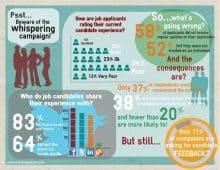Your hiring process will provide the very first impression a candidate is going to have for your company. It’s easy to think that candidates will overlook a dysfunctional hiring process if they really want to work for you, but that’s really not true. A bad hiring process can cause you to lose top talent, and you might not even know that it’s happening.
If you ask candidates how their hiring process went, what do you think the answer would be? From pushy recruiters, to poorly written emails, to delayed interviews or  lack of communication after the interview – there are many things that can go wrong in the hiring process that can make a candidate say “No thanks!”
lack of communication after the interview – there are many things that can go wrong in the hiring process that can make a candidate say “No thanks!”
It’s easy for recruiters and hiring managers to be bogged down with candidates, interviews, paperwork, and other aspects of their day-to-day job. No wonder that thinking about the candidate’s experience through the interview process is not always top of mind. When your team is focused on process and deadlines, it’s easy to slip-up in getting back to candidates in a reasonable time to keep them in the loop.
Having a good hiring process with clear expectations, touchpoints, and proper communication is key. Here are a few things to keep in mind to ensure that your company’s hiring or recruiting process is leaving a good impression on candidates.
- Make Sure The Experience Is A Good One … Or Risk Your Reputation
If a candidate comes away from a bad hiring process or bad interview, they’re going to talk about it. Word of mouth is incredibly powerful, and you don’t want top talent telling their colleagues or other professionals about how terribly they were treated. Bad stories spread like wildfire, which is why you should make it a priority to avoid  those situations altogether.
those situations altogether.
Particularly when you’re hiring at the executive level, you really want to make sure that candidates are treated fairly and with respect. The pool of top talent gets smaller and smaller at the top of the pyramid, so it’s easy for one bad story to taint the whole pool.
A good hiring process and set of standards across your entire hiring or recruiting team is a must to ensure that the experience is planned and tracked the whole way through. This way, you can have guidelines and a way of making sure a certain level of expectations are met across the board.
Read More: Hiring Techniques: Why Should I Work For Your Company If You Won’t Address These Issues?
- A Bad Process Will Deter Talent From Wanting To Work For You
If the hiring process is disorganized, slow, and unprofessional, then chances are the candidates are going to assume that working for your company will be the same. Your hiring managers or recruiters are basically the first impression candidates will get of your company – it doesn’t matter if the actual manager or executive is amazing, or the company is doing great things. If the hiring process is bad, it reflects on your whole company.

Don’t leave candidates asking, “Is working here going to be like this?” You want top talent to be absolutely wowed by your company. Especially when you’re competing for C-Suite attention or battling your competitors to fill an open position, you can’t risk your company looking like an undesirable place to work.
If you’re curious to get feedback on how your hiring process was for both successful and unsuccessful candidates, send out a quick survey afterwards to get feedback. You can use a free survey system, like Survey Monkey, and ask 5 simple and easy questions with a box for suggestions or comments at the end. This way, you’ll be able to get a good idea about how your process is to outsiders and you’ll be able to keep your team accountable.
Read More: Hiring Techniques: The Top 8 Common Recruiting Mistakes (And How To Avoid Them)
- Communication is #1
Don’t leave your candidates hanging. Over-communication is better than no communication and it’s important to be transparent about where you’re at in the process. At a time where people are receiving constant communication on social media, text messaging, and emails, prompt communication is expected more than ever.
 If a candidate feels like they’re not going to hear back, or that their time isn’t being respected, you might lose their interest completely. If you’re hiring for a specific niche specialty or looking to attract an executive who could bring significant change to your organization, you really want to make sure that you’re keeping them in the loop unless you want to lose them to a competitor.
If a candidate feels like they’re not going to hear back, or that their time isn’t being respected, you might lose their interest completely. If you’re hiring for a specific niche specialty or looking to attract an executive who could bring significant change to your organization, you really want to make sure that you’re keeping them in the loop unless you want to lose them to a competitor.
Email candidates with updates and explain any delays. Let them know how the process is going to work out and what the next steps are, and also tell them when they can expect to hear from you (and then meet that deadline) so they aren’t kept waiting.
- Only Interview If You’re Actually Ready To Hire
Month-long (or longer!) hiring processes are becoming a thing of the past – and good riddance. When people are ready to find a new job, or start the process of looking  for a new job, they don’t want it to drag on for months. If you need certain individuals within your organization to be part of the hiring process, make sure they’re available and ready to commit time to be involved. Remember, all it takes is one bad experience and you risk tainting your company for a many potentially great future employees.
for a new job, they don’t want it to drag on for months. If you need certain individuals within your organization to be part of the hiring process, make sure they’re available and ready to commit time to be involved. Remember, all it takes is one bad experience and you risk tainting your company for a many potentially great future employees.
- Give Feedback When Appropriate
 A lot of hiring managers and recruiters don’t give feedback to unsuccessful applicants. Sometimes this is for good reason, as unsuccessful candidates can view the stated reason that they were unsuccessful as an objection to be overcome with further argument and try to provide evidence to the contrary. Recruiters and hiring managers don’t want to go down that unproductive road, which leads them to provide vague or no tangible reason other than “other candidates were a closer fit”.
A lot of hiring managers and recruiters don’t give feedback to unsuccessful applicants. Sometimes this is for good reason, as unsuccessful candidates can view the stated reason that they were unsuccessful as an objection to be overcome with further argument and try to provide evidence to the contrary. Recruiters and hiring managers don’t want to go down that unproductive road, which leads them to provide vague or no tangible reason other than “other candidates were a closer fit”.
In some cases, it may be possible to provide some helpful advice to candidates without risking the issues mentioned. In these cases, candidates will appreciate your frankness.
Process and Feedback Is Key
The most important thing you can do to make sure your hiring experience is great from start to finish is to have an established process and feedback loop in place. A process gives your team guidelines to work from and iterate as things change, and allowing feedback means you can have a line of sight on what works and what doesn’t.
process gives your team guidelines to work from and iterate as things change, and allowing feedback means you can have a line of sight on what works and what doesn’t.
The more informed you are, the more you can make sure that your hiring process is winning top talent, not losing them.
Kathbern Management is an executive search consultancy based in Toronto, helping companies find the executives and senior managers who not only have the experience and credentials to fulfil their responsibilities, but also have the emotional and “fit” requirements that will enable them to be successful in a particular environment. We simplify the process and, through our deep research, are able to bring more and better candidates forward than would ever be possible through a do-it-yourself passive advertising campaign.
Contact us today for a free consultation about your key person search.

